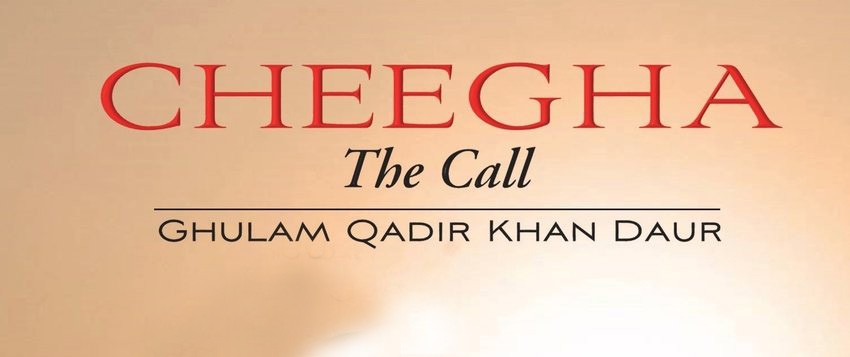
Ghulam Qadir Khan Daur’s book Cheegha -- The Call brings to light the softer side of tribesmen

I was anxiously waiting for the book Cheegha -- The Call, as it was quoted no less than five times by Prof Akber S Ahmed in his latest book The Thistle and the Drone. Finally, after a long wait, I have the book which is primarily about the tribal areas, especially Waziristan and about Pakhtunwali, the way of life of the people of this area.
The book introduces the instruments of tribal administration which are specific and measurable, by which tribesmen manage their day-to-day affairs, including dispute resolution, share in profit and loss of each tribe, peace keeping and safety nets for protecting and preserving the weak.
To make the book interesting, the author takes the reader to the heart of the beautiful Tochi Valley and into tribal homes and makes him/her live and talk to the poor but proud people. He introduces his beautiful village Darpa Khel, its activities, the festivals and ceremonies.
For the first time, the softer side of tribal life is brought to light and one tends to know a tribesman, his dreams and aspirations, his love and care through his folklore and music. By explaining his relations with his kinsmen (even Hindus), his women and his rifle, the tribesman has been made accessible to the world. The book -- laying bare the noblest of people, humorous, proud and trustworthy -- makes tribesmen as lovable and acceptable to the reader as they, in all fairness, should be. All they want, says the author, is to be honourable men like their forefathers.
The author of the book, Ghulam Qadir Khan Daur, belongs to a recognised tribe of North Waziristan. Educated in one of the finest institutions of Pakistan, he mixes scholarship with experience and is, thus, the best guide into the tribal areas. He served as a Political Agent, Home Secretary and on other important assignments in tribal areas.
Nothing original has come out of the tribal areas after Sir Olaf Caroe, Evelyn Howell and James Spain, who saw the area from administrators’ position. The British were at war with the tribesmen, hence, all their romance with the Frontier is related to war and chivalry, honour and pride.
Almost all recent books on Pakhtuns are practically about Taliban and militancy put together as research work by non-Pakhtuns, mostly in Afghanistan, and all writing from hearsay, drawing inferences from events. So little and so biased, this has created a very wrong impression, as if tribesmen do nothing but fight.
After the Russian invasion of Afghanistan, life in the tribal areas had changed forever. For them, there is nothing but war for the last 30 years. "Large amounts of funds were pumped in for Mujahideen; arms, ammunition, criminals and terrorists, the scum of the earth were off loaded on our land. The international community, in connivance with our leadership, converted our innocent children into monsters, filled with hate and rage…This was the Afghan Jihad and the whole free world was a party to it. Once its objectives were achieved, the free world carelessly walked away," says the author.
The peaceful tribal areas and the peaceful lives of the tribes have been devastated by war on terror while Taliban, al Qaeda, Pakistan army and NATO forces have all contributed to their miseries. The partners made a distinction of good and bad Taliban, not realising that good Taliban for one are bad for the other. "Faceless enemies are supporting terrorists. They are getting funds, equipment and trainings and no one has been able to stop their access. The situation in the village got bad; perforce we had to leave for safety reasons. Baba (father) and Morr (mother) were completely devastated while leaving the village and compared their exit to the exodus of Hindus after the 1965 war. Our Hindu kinsmen left Waziristan out of fear of annihilation. Waziristan is condemned to repeat history," writes the author.
The book narrates firsthand experience on the impact of terrorism on Pakhtunwali, the culture Pakhtuns love so much, a culture that evolved over thousands of years and is now systematically being replaced by the warring factions with an alien culture in the name of religion.
This book is a lone voice against the threat to the tribal way of life. "The tribal way of life is shattered; tribesmen have been stripped of their pride and human dignity and have been robbed of the two things they lived for, their culture and religion. Pakhtunwali cries for help before extinction", says the author.
Waziristan is the last outpost, the only hope for Pakhtunwali to stay alive, a resilient culture which outlived Iranian, Indian and British cultural onslaughts. It is under a serious threat from Arab cultural imperialism under the garb of Islam.
Cheegha is a response to the world media that portrays tribesmen as terrorists. The book focuses on Pakhtunwali, especially the softer side of tribal life trying to prove that tribesmen are as loving and caring as anyone else.
Cheegha or chagha in Pashto means a scream for help by a victim in pain. The author concludes by giving a way forward, to a world interested in stopping the genocide of a nation. The author calls on all Pakhtuns and human rights activists around the globe to stand up to all those against Pakhtuns and Pakhtunwali and reminds them that united they can defeat any foe no matter how strong. He invites them to be part of the Cheegha in support of Pakhtunwali.
Printed by Wisehouse Publishers Sweden, the book is a must read for all the Pakhtuns living in Europe and US, especially the second generation of those who left after the Russian invasion and would like to know how their fathers lived. Many international NGOs working in Afghanistan and Pakistan will like to know about the people. It is an interesting reading for anyone interested in travel and social anthropology.